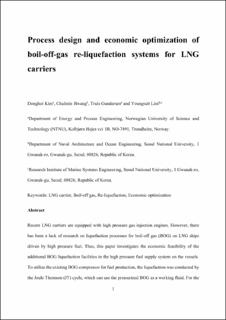Process design and economic optimization of boil-off-gas re-liquefaction systems for LNG carriers
Peer reviewed, Journal article
Accepted version
Permanent lenke
https://hdl.handle.net/11250/2648516Utgivelsesdato
2019Metadata
Vis full innførselSamlinger
Sammendrag
Recent LNG carriers are equipped with high pressure gas injection engines. However, there has been a lack of research on liquefaction processes for boil-off gas (BOG) on LNG ships driven by high pressure fuel. Thus, this paper investigates the economic feasibility of the additional BOG liquefaction facilities in the high pressure fuel supply system on the vessels. To utilize the existing BOG compressor for fuel production, the liquefaction was conducted by the Joule Thomson (JT) cycle, which can use the pressurized BOG as a working fluid. For the comparison of the fuel supply system and its variations with BOG liquefaction, they are optimized with respect to total annual cost (TAC) as the objective function. With an LNG price of 5 USD/MMBtu, the optimization results show that the use of BOG liquefiers on LNG vessels reduces the TAC by at least 9.4% compared to the high pressure fuel supply system. The use of a liquid turbine in the liquefaction configurations also resulted in 2.4% savings in TAC compared to the JT cycle based process. However, a sensitivity analysis with different LNG prices indicates that the liquefaction systems are not economical compared to the fuel supply system when the LNG price is lower than 4 USD/MMBtu.

